Overview
The article emphasizes the crucial role of CRM solutions in the healthcare sector, aimed at enhancing patient care through improved engagement and operational efficiency. It highlights key platforms, including:
- CareSet
- Salesforce Health Cloud
- Microsoft Dynamics 365
It showcases how their features—such as data integration, analytics, and communication tools—empower healthcare providers to make informed decisions. This capability fosters stronger relationships with patients, ultimately resulting in better health outcomes. By leveraging these advanced CRM solutions, healthcare organizations can significantly elevate their service delivery and patient satisfaction.
Introduction
In the rapidly evolving landscape of healthcare, the demand for precise and actionable data has never been more critical. As Medicare Advantage enrollment surges and the complexity of patient care increases, organizations are increasingly turning to innovative solutions that leverage comprehensive data insights.
From CareSet’s deep analysis of Medicare claims to platforms like Salesforce Health Cloud and Microsoft Dynamics 365 Healthcare, the focus is on enhancing patient engagement and operational efficiency.
This article explores a range of cutting-edge CRM solutions designed to transform healthcare delivery, improve patient outcomes, and streamline communication.
Ultimately, these advancements foster a more effective and patient-centric healthcare system.
CareSet: Comprehensive Medicare Data Insights for Enhanced Patient Care
CareSet distinguishes itself in the healthcare analytics sector by delivering comprehensive insights derived from Medicare claims, analyzing over $1.1 trillion in annual claims. This meticulous examination empowers stakeholders to uncover treatment patterns, understand provider networks, and assess demographics with precision. The surge in Medicare Advantage enrollment, rising from 20 million in 2018 to 33 million in 2024, underscores a significant shift in beneficiaries’ preferences for receiving Medicare benefits, highlighting the critical need for accurate information. CareSet’s data-driven methodology equips pharmaceutical companies and healthcare organizations with the insights necessary to make informed decisions, thereby enhancing care quality and optimizing treatment strategies.
A recent case study exemplifies this impact, showcasing how an oncology treatment producer utilized CareSet’s Medicare insights to improve engagement with medical providers regarding late-stage treatment options. This practical application of insights illustrates their value in real-world scenarios. By prioritizing transparency and accuracy, including the acknowledgment that estimates are rounded to the nearest whole number, CareSet ensures clients receive high-quality insights that facilitate effective market access and engagement initiatives. This commitment not only addresses immediate data requirements but also fosters long-term strategic growth within an evolving healthcare landscape.
As articulated in Jimmo v. Sebelius, ‘Now is the time to unite as allies and investigate methods to support comprehensive Medicare coverage, health equity, and quality health services.’ This sentiment aligns seamlessly with CareSet’s mission to enhance care, reinforcing the importance of collaboration in advancing healthcare outcomes.
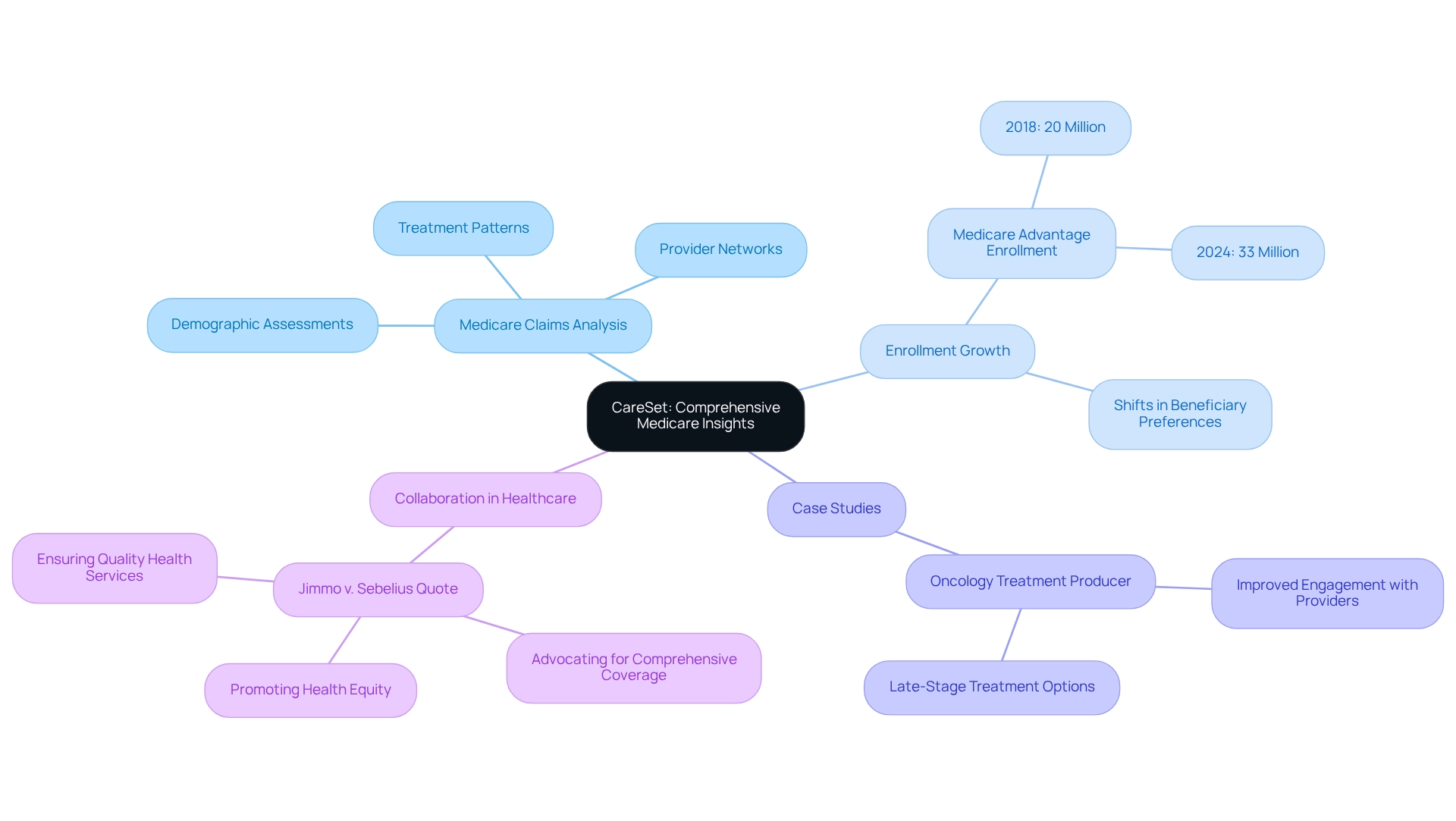
Salesforce Health Cloud: Streamlining Patient Engagement and Operations
Salesforce Health Cloud presents a powerful platform that significantly enhances user engagement and optimizes medical operations. Key features such as customized care plans, immediate access to client information, and integrated communication tools empower medical providers to forge stronger connections with their clients. By centralizing client information, the platform facilitates more coordinated care, which is vital for improving health outcomes. Furthermore, Salesforce’s unwavering commitment to HIPAA compliance ensures that client information is managed securely, bolstering its reputation as a trustworthy solution for medical organizations.
CareSet integrates over 100 external information sources for its analysis, underscoring the importance of comprehensive informational strategies in enhancing client outcomes and optimizing the pharmaceutical product lifecycle. Recently, CareSet Systems has unveiled innovative analytics products, including advanced analytical tools and predictive modeling capabilities, designed to refine drug launch strategies and offer deeper insights into health. These products aim to empower medical professionals by leveraging Medicare data, as illustrated in a case study focused on oncology treatment choices, which shows how timely engagement with medical practitioners can significantly impact care for individuals. Recent statistics indicate that CRM for healthcare industry solutions, such as Salesforce Health Cloud, can lead to a 30% increase in engagement from individuals, underscoring the platform’s effectiveness in transforming client interactions. Case studies, including CareSet’s ‘Long-Term Strategic Growth for Partners in Health,’ reveal how providers have streamlined operations and improved experiences for individuals through the adoption of Salesforce Health Cloud, highlighting its influence on both operational efficiency and patient outcomes. As Jagney Dave, Vice President of Client Engagement, asserts, ‘Effective involvement of individuals is crucial for success in the medical field, and CRM solutions like Salesforce Health Cloud are vital in accomplishing this objective.’ This reinforces the idea that CRM for healthcare industry solutions are essential for enhancing service offerings and improving operational efficiencies.
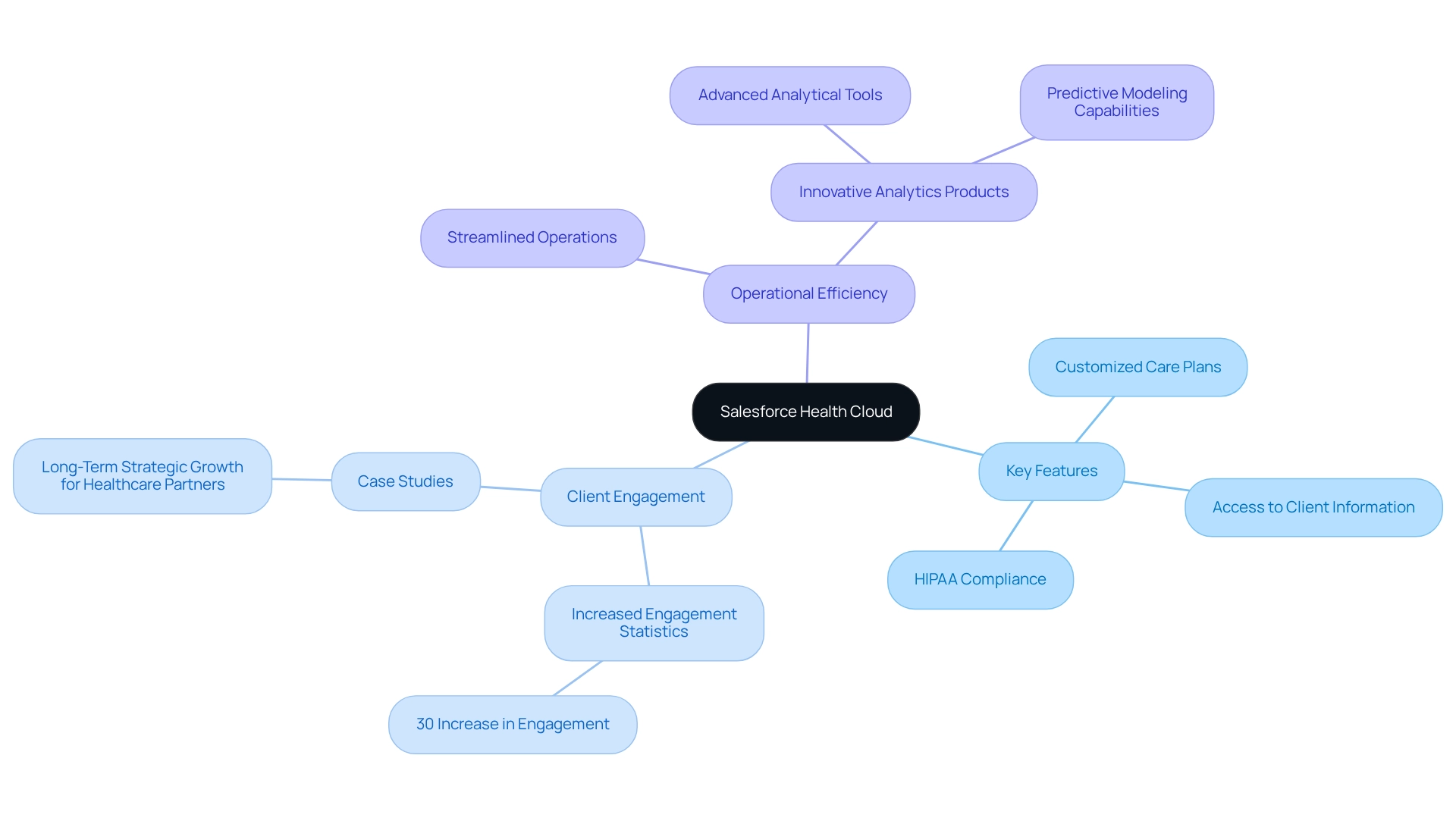
Microsoft Dynamics 365 Healthcare: Enhancing Patient Relationship Management
Microsoft Dynamics 365 Healthcare serves as a CRM for the healthcare industry, specifically designed to address the unique challenges faced by medical professionals in managing client relations. This platform offers a comprehensive suite of features, such as:
- Appointment scheduling
- Effective communication with individuals
- Robust analytics
All aimed at creating a seamless experience for both patients and practitioners. By leveraging AI-driven insights and Medicare data, healthcare organizations can proactively anticipate individual needs and tailor interactions, resulting in significantly improved satisfaction rates. Notably, 80% of individuals prefer digital communication with their healthcare providers, underscoring the critical importance of these capabilities.
Moreover, CareSet’s involvement in the case study titled “Putting Individuals First: Unlocking Medicare Data to Empower HCP” exemplifies how organizations utilizing Dynamics 365 have successfully enhanced engagement with individuals, particularly concerning oncology treatment options like Qinlock for Gastrointestinal Stromal Tumor (GIST). This effective engagement and care coordination can help close gaps in care and reduce hospital readmission rates, ultimately leading to better health outcomes and cost savings.
As the digital healthcare engagement market continues to grow, projected to expand by over 18% annually until 2025, the strategic implementation of CRM for the healthcare industry, like Microsoft Dynamics 365 Healthcare, becomes increasingly vital for organizations seeking to improve relationship management and overall care results. Furthermore, with 57% of individuals recognizing the impact of social media on their choice of medical provider, a strong digital presence bolstered by Microsoft Dynamics 365 is essential for enhancing engagement and educating individuals.
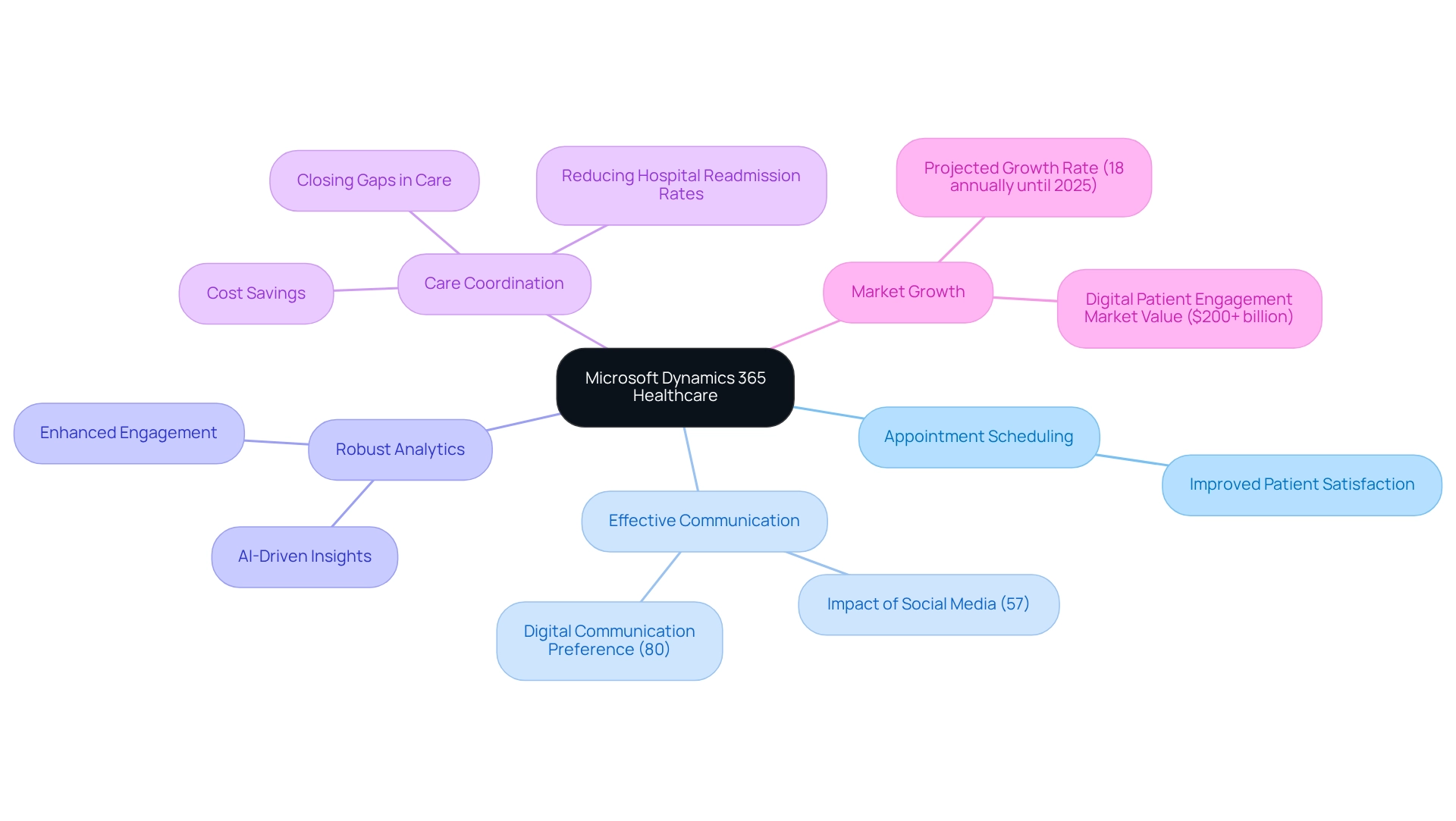
HubSpot CRM: Effective Patient Communication and Marketing Management
HubSpot CRM is a formidable solution in the CRM for the healthcare industry, designed to elevate client communication and marketing management. Its intuitive interface streamlines the segmentation of client data, enabling tailored communication strategies that resonate with individual needs. Automated workflows enhance operational efficiency by managing appointment reminders, follow-up emails, and the distribution of educational content, ensuring that individuals remain engaged throughout their care journey.
The platform’s robust analytics capabilities yield valuable insights into consumer behavior, empowering organizations to refine their marketing strategies and boost overall satisfaction. Compelling statistics indicate that effective communication with individuals can significantly influence medical outcomes; for instance, improving one metric for plans with 3.5 stars can elevate revenue by $2 PMPM on average. This underscores the financial benefits of enhanced communication strategies with individuals receiving care.
Practical applications of HubSpot CRM illustrate its efficiency; medical practitioners utilizing this tool have reported enhanced client interactions and streamlined marketing efforts. A notable example is the case study of an oncology treatment provider that successfully engaged medical providers regarding the 4th line of therapy, Qinlock, for individuals with Gastrointestinal Stromal Tumor (GIST). By leveraging Medicare data, they fostered prompt and meaningful interactions with doctors, showcasing the potential of data-informed strategies in advancing healthcare.
As Ira Brooker, a freelance writer and editor, articulates, “From simplified template management to automated workflow reviews and approvals to easy omnichannel distribution, MHC software allows your practice to connect with customers with personalized communications delivered on the platforms they prefer.”
In an evolving medical landscape, the adoption of CRM for the healthcare industry becomes imperative for organizations striving to enhance engagement and improve care delivery.
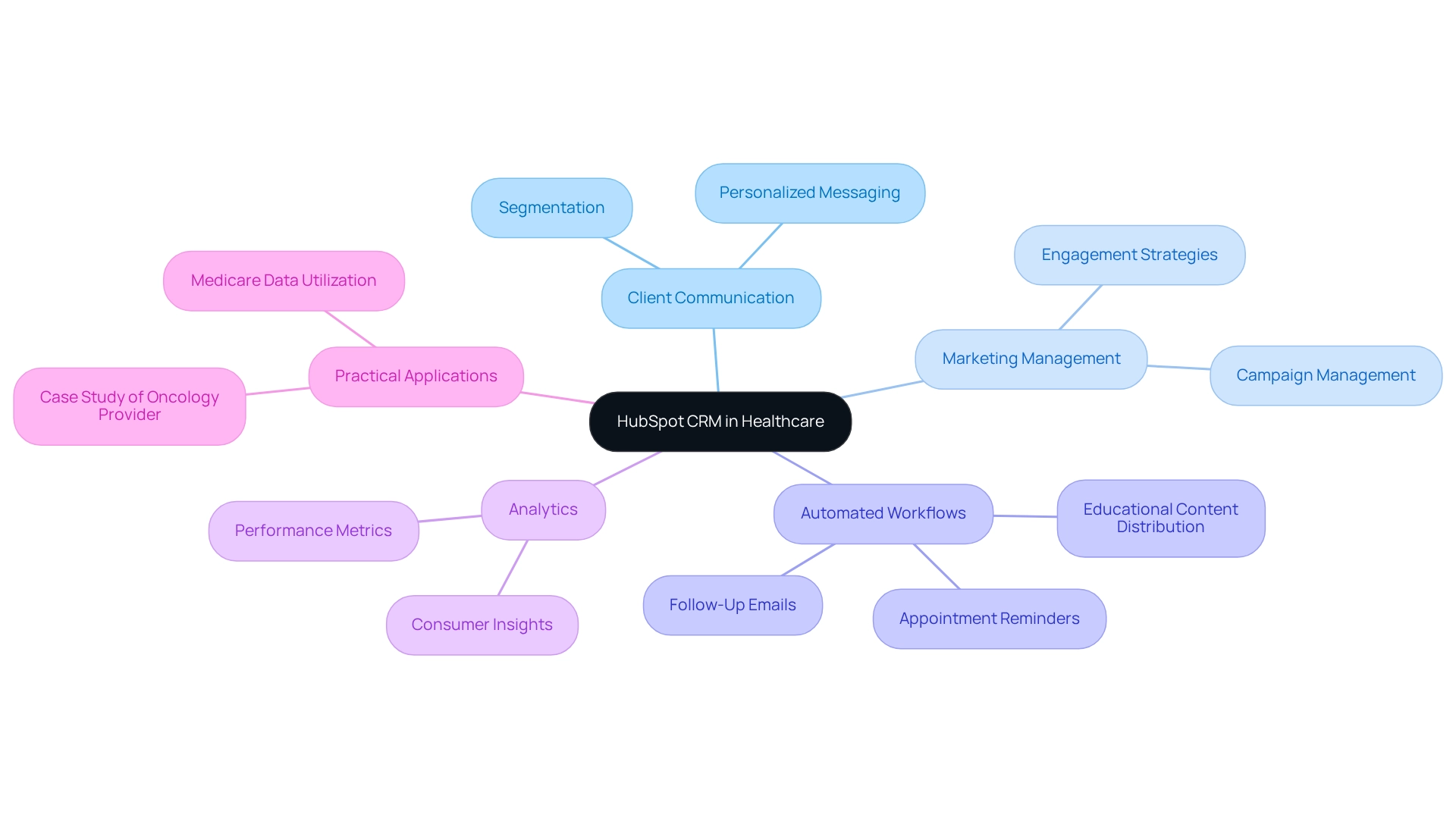
Zoho CRM for Healthcare: Customizable Solutions for Operational Efficiency
Zoho CRM for Healthcare presents a highly customizable platform that empowers healthcare organizations to tailor their operations to specific requirements. Key features—including client management, appointment scheduling, and billing integration—streamline workflows, significantly enhancing operational efficiency. The platform’s adaptability allows providers to develop custom fields and forms, ensuring precise capture of all relevant client information. Additionally, Zoho’s mobile features enable medical teams to access essential information while traveling, enhancing responsiveness and elevating the overall quality of patient care.
Recent statistics reveal that organizations utilizing Zoho CRM have reported operational efficiency enhancements of up to 30%, underscoring the platform’s effectiveness in optimizing processes. CareSet’s integration of over 100 external information sources for comprehensive insights further emphasizes the critical nature of leveraging information to improve operational efficiency. This data leadership is vital for medical providers, particularly concerning drug launches and individual engagement strategies. Real-world instances illustrate how customizable solutions within Zoho CRM have revolutionized client management.
As the medical landscape evolves, the latest features of Zoho CRM continue to bolster digital transformation initiatives, reinforcing its role as an essential tool for enhancing user engagement and operational success. According to Jagney Dave, Vice President of Client Engagement, “CRM Market growth in the medical sector is driven by rising client engagement initiatives, digital transformation, and automation in medical services.” This statement highlights the pivotal role that CRM for healthcare industry solutions play within the healthcare sector. Furthermore, integrating Kixie’s AI-driven voice and SMS platforms can further enhance CRM capabilities, streamlining sales processes and improving client interactions.
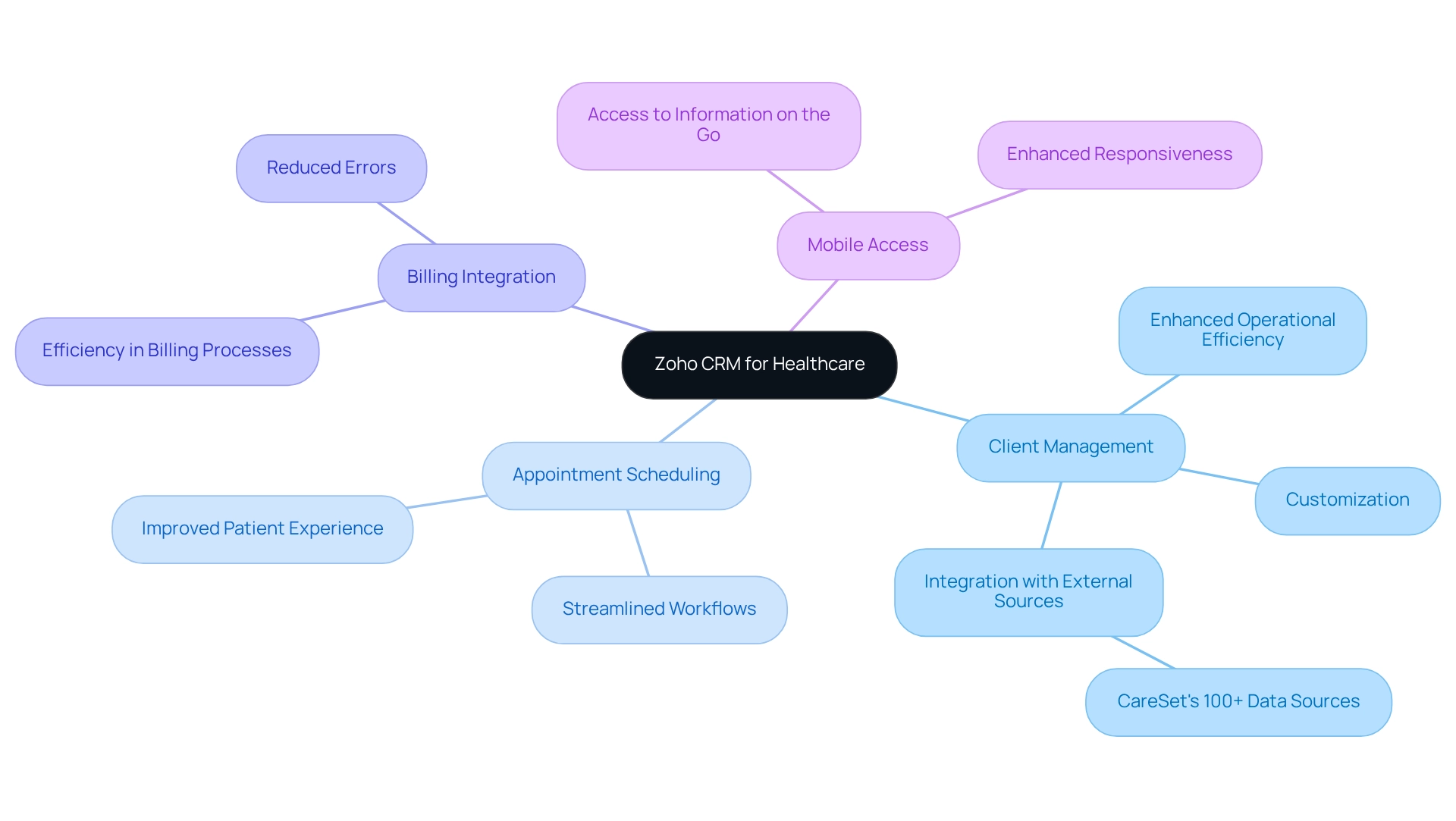
Pega Healthcare CRM: Advanced Analytics for Improved Patient Outcomes
Pega Healthcare CRM leverages advanced analytics to markedly enhance healthcare outcomes. By integrating diverse data sources, this platform equips medical organizations with actionable insights that facilitate informed decision-making. Its predictive analytics capabilities empower practitioners to identify at-risk individuals early, enabling proactive interventions that can reduce hospital readmissions and improve overall health outcomes.
This focus on client-centered care allows service providers to deliver tailored experiences that effectively address individual client needs, emphasizing the role of CRM for the healthcare industry, as highlighted by a study from Duke University which revealed that predictive modeling could identify nearly an additional 5,000 client no-shows annually. This statistic highlights how Pega’s predictive analytics can refine patient engagement strategies within the CRM for healthcare industry, ensuring that medical resources are utilized both efficiently and effectively.
Real-world applications of predictive analytics within the medical field showcase its transformative potential. For example, large-scale analytics have proven crucial in drug testing, disease diagnosis, and reducing hospital readmission rates. CareSet Systems has introduced innovative analytics products, such as [specific product names], aimed at enhancing drug launch strategies and increasing medical professional engagement, particularly in oncology treatment options.
With the growing accessibility of machine learning and biosignal information, Pega’s CRM for healthcare industry is uniquely positioned to harness these advancements, applying predictive analytics to enhance care and service delivery. By 2025, the Asia Pacific region is projected to experience a remarkable compound annual growth rate (CAGR) of 34.2% in digital medical solutions. This growth underscores the increasing reliance on advanced analytics in the medical sector, with the CRM for healthcare industry provided by Pega Healthcare leading this evolution and empowering medical professionals to leverage analytics for improved outcomes for patients and streamlined service delivery.
As noted by Straits Research, hospitals and clinics are progressively utilizing advanced analytics, including machine learning, to uncover vital information, further emphasizing the critical role of CRM for healthcare industry in this landscape. Moreover, insights derived from Medicare data, as highlighted in CareSet’s case studies, allow medical providers to engage more effectively with patients, particularly regarding oncology treatment options.
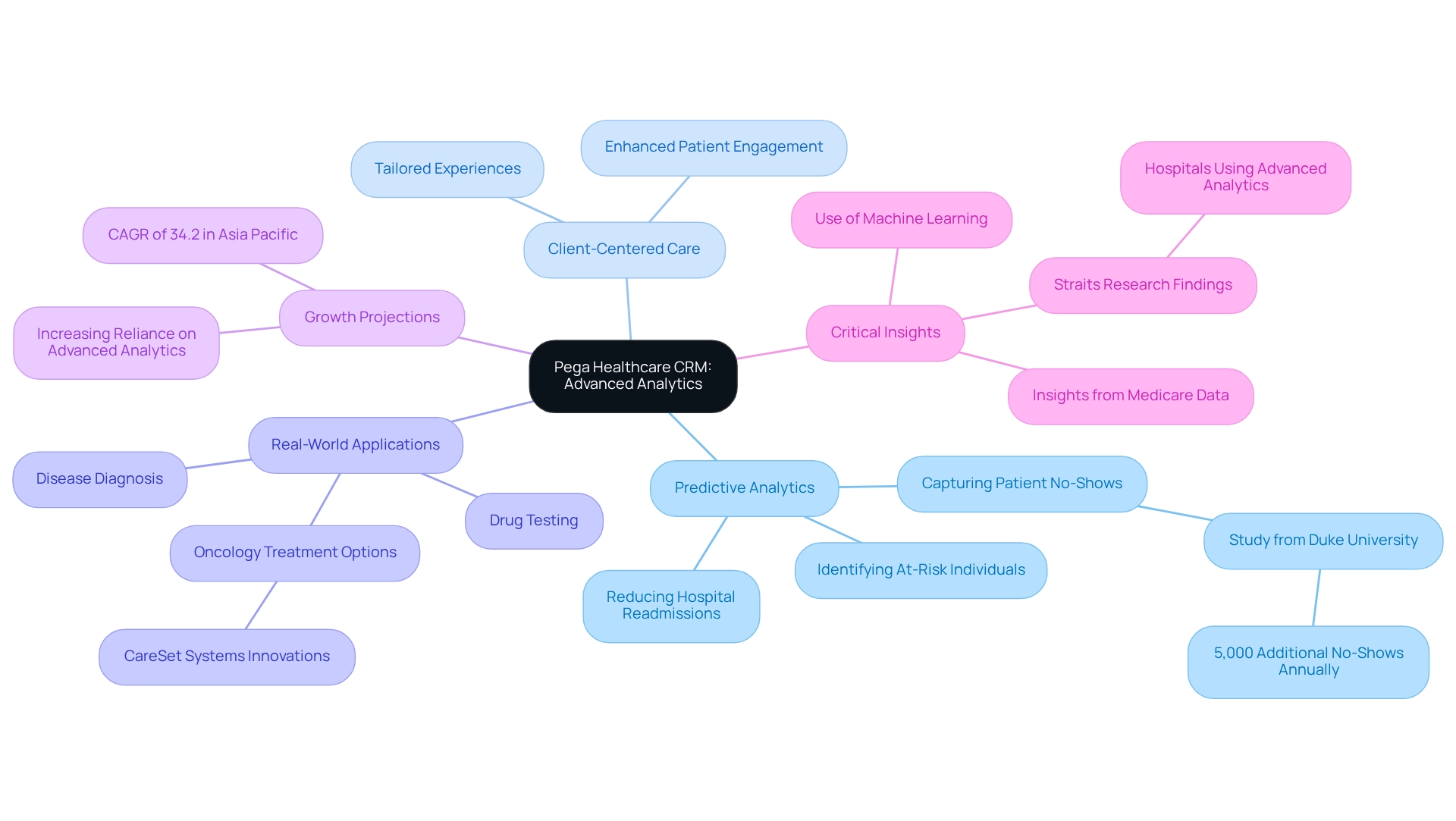
Oracle Health Sciences: Integrating Clinical and Operational Data for Better Decisions
CareSet Systems offers groundbreaking analytics products designed to enhance drug launch strategies and provide in-depth medical insights. By harnessing comprehensive Medicare information, CareSet empowers medical enterprises to make informed decisions that drive strategic growth. These solutions deliver critical perspectives on individual needs, supplier networks, and pharmaceutical usage, all of which are essential for effective medical decision-making.
In October 2016, CareSet introduced four new dynamic analytics products that have significantly transformed how medical organizations integrate clinical and operational data. This integration is crucial, as research indicates that organizations employing comprehensive analytics platforms can anticipate a return on investment within 14 to 18 months, with benefits accelerating thereafter, according to HIMSS Analytics.
Real-world applications of CareSet’s solutions illustrate marked improvements in decision-making. For example, medical practitioners leveraging CareSet’s analytics have reported enhanced outcomes for patients through more targeted interventions and optimized care pathways. Furthermore, the platform’s commitment to information security ensures that sensitive client information remains protected, fostering trust between patients and providers. As the medical landscape continues to evolve, CareSet Systems establishes itself as a leader in facilitating informed decision-making through integrated information solutions. Additionally, the growing emphasis on extensive analytics in the healthcare sector is evident in emerging economies, where rising investments in health services and supportive government initiatives are expected to catalyze significant growth in this domain. This trend underscores the broader impact of data analytics in advancing healthcare, particularly in rapidly changing markets. Selecting the right partner for integration and interoperability is vital for medical organizations to fully capitalize on these advanced analytics solutions.
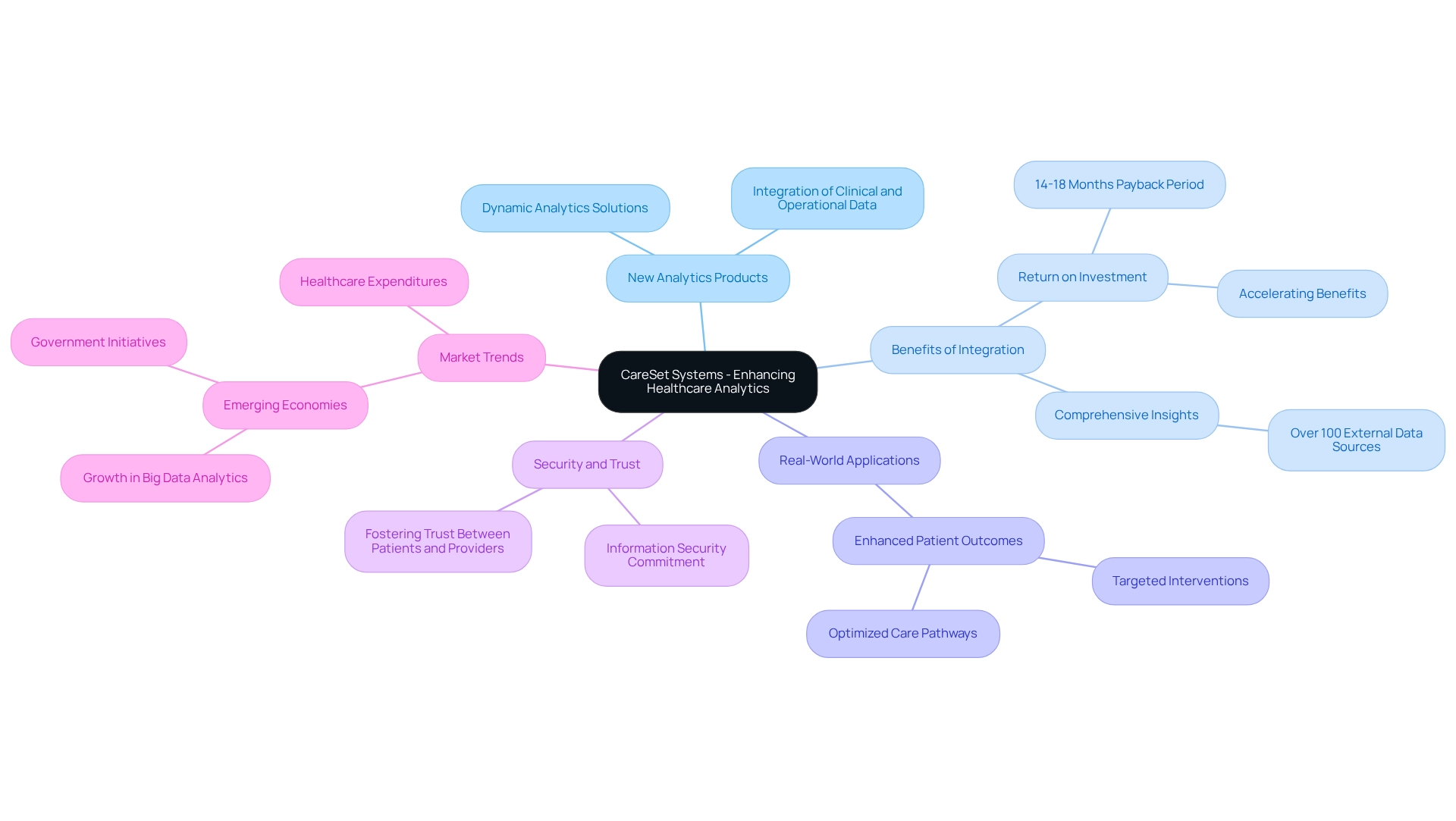
Zendesk Sell: Enhancing Patient Relationships with Effective Communication Tools
Zendesk Sell stands out as a robust CRM solution designed to enhance client relationships through a suite of effective communication tools. Key features—such as automated follow-ups, communication tracking, and pipeline management—within a CRM for the healthcare industry empower medical practitioners to ensure that no individual is overlooked. The platform’s seamless integration with other Zendesk products fosters a smooth flow of information, allowing medical teams to respond promptly to patient inquiries and needs. This proactive strategy cultivates open channels of communication, which are essential for establishing trust and loyalty among patients, especially when utilizing a CRM for the healthcare industry in the domain of oncology treatment options for rare conditions like Gastrointestinal Stromal Tumor (GIST), where leveraging Medicare information can significantly enhance engagement with medical professionals.
A recent case study illustrated how an oncology treatment manufacturer utilized CareSet’s information leadership to improve timely interactions with physicians regarding the 4th line of therapy, Qinlock. This strategic application of data not only enhanced communication but also enabled medical providers to make informed decisions regarding treatment alternatives, underscoring the effectiveness of CRM for the healthcare industry in facilitating these outcomes. As a result, medical providers employing CRM for the healthcare industry can anticipate heightened satisfaction among clients and improved health outcomes.
Practical applications of Zendesk Sell demonstrate its efficiency; for instance, automated follow-ups have been shown to greatly enhance client engagement and retention, ultimately leading to a more favorable experience in medical care. Furthermore, the case study on ‘Batch and On-demand Document Creation’ illustrates how an automated system can scale document creation to meet diverse needs, aiding in maintaining brand consistency while effectively managing various communication requirements.
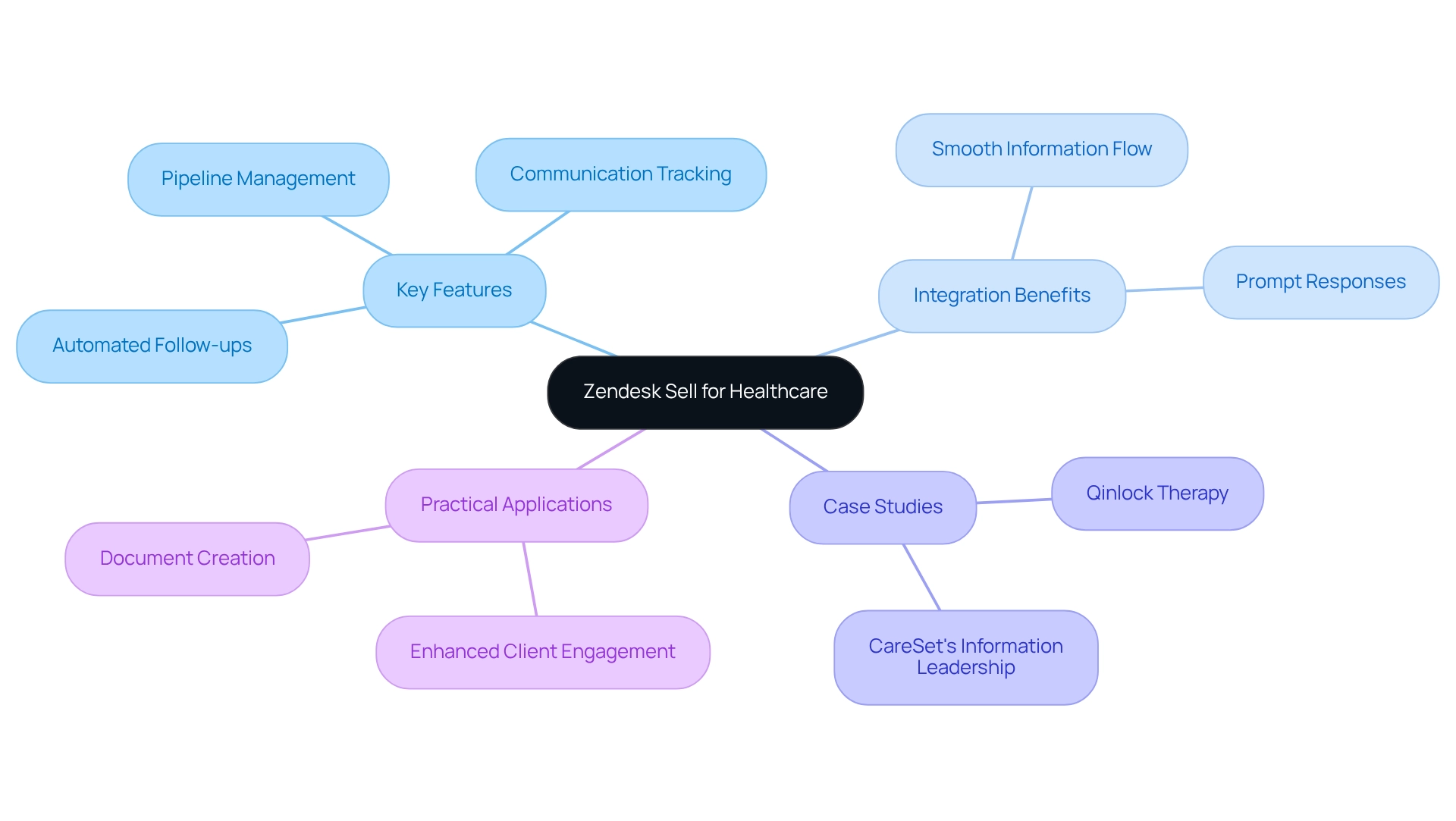
Epic Systems Corporation: Comprehensive Patient Management Solutions
Epic Systems Corporation stands out with its comprehensive management solutions that significantly enhance medical service delivery. By integrating electronic health records (EHR), appointment scheduling, and billing systems into a unified interface, Epic empowers medical practitioners to manage all aspects of care seamlessly. A pivotal feature of Epic’s platform is its commitment to interoperability, ensuring that individual data is easily accessible across diverse medical settings, thus promoting coordinated and efficient care.
The platform’s sophisticated analytics capabilities allow providers to monitor outcomes and refine care strategies over time. For example, Cleveland Clinic’s recent digital transformation initiative, which incorporates Epic’s solutions, seeks to redefine medical service delivery through accelerated digital technology and artificial intelligence. This initiative not only enhances operational efficiency but also significantly improves engagement, positioning Cleveland Clinic as a frontrunner in medical innovation.
Data indicates that effective management solutions for individuals, such as those offered by Epic, which include a CRM for the healthcare industry, are crucial for improving medical service delivery. Notably, the Indian Health Service accounted for only 0.5% of the leading ambulatory EHR vendors, underscoring the competitive landscape in which Epic operates. Medical professionals emphasize that interoperability is vital for safeguarding individuals’ well-being and ensuring the resilience of medical organizations. Judith Faulkner, CEO of Epic Systems, encapsulates this mission by stating, “We aim to maintain individuals’ well-being, support medical organizations, and ensure clinicians are satisfied.”
With ongoing updates in 2025, Epic Systems continues to advance its patient management solutions, reinforcing its role in enhancing medical delivery and patient care. The substantial progress achieved in the EHR sector, driven by regulatory demands and technological advancements, further underscores the significance of Epic’s solutions in today’s medical landscape.
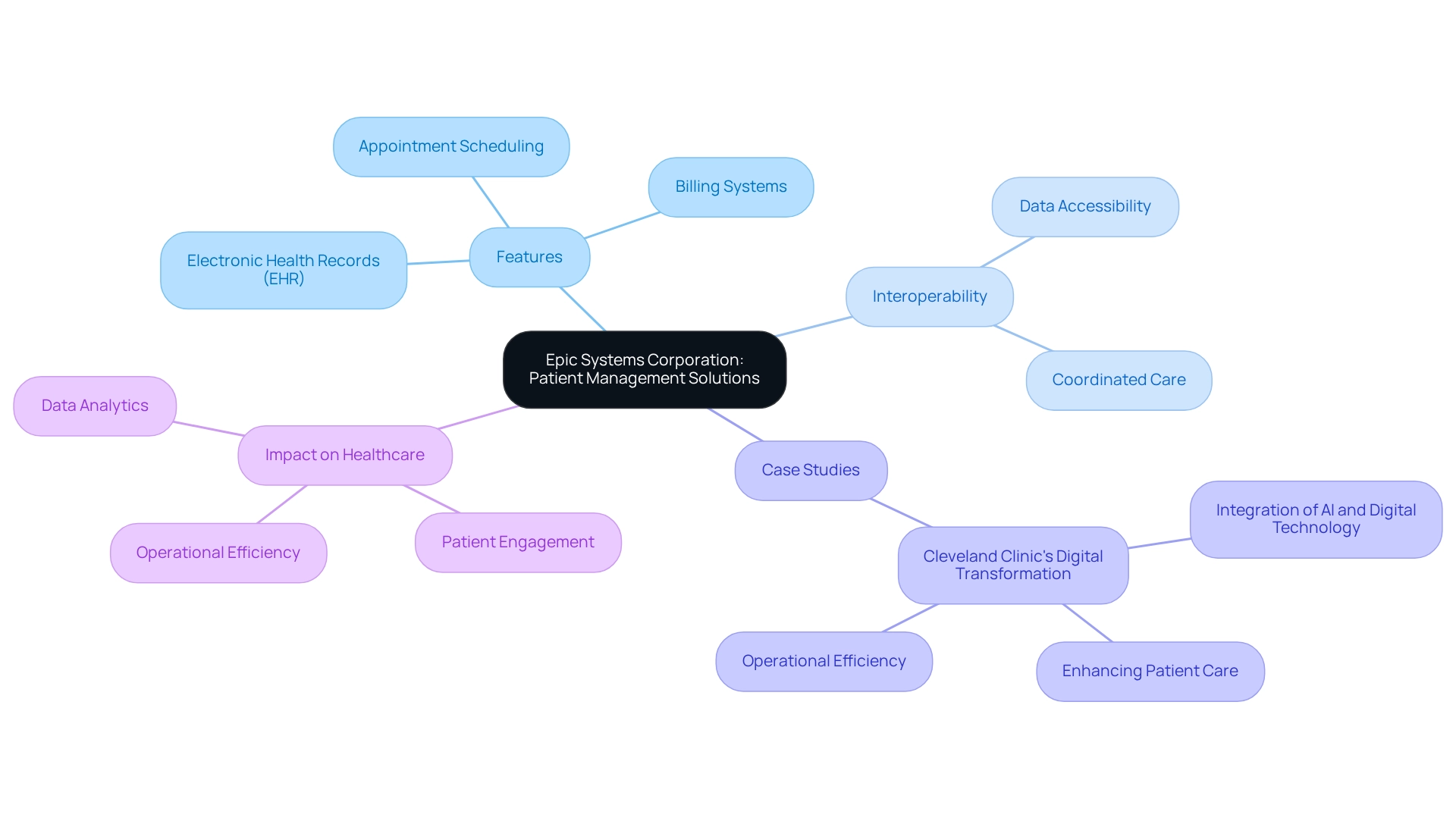
NetSuite CRM: Cloud-Based Solutions for Improved Patient Data Management
CareSet Systems has unveiled groundbreaking analytics products designed to enhance drug launch strategies and improve medical insights, particularly through the effective utilization of Medicare information. These innovative products offer advanced analytics features that empower medical organizations to make data-informed decisions, boost user engagement, and streamline operational processes. By leveraging real-time information, CareSet’s solutions facilitate prompt and impactful interactions with medical providers, ultimately leading to improved outcomes for individuals. This comprehensive approach to information requirements fosters long-term strategic development for medical organizations, underscoring the importance of efficient information management. As the healthcare landscape continues to evolve, the integration of CareSet’s data science products and a robust CRM for the healthcare industry becomes essential for organizations seeking to optimize their operations and elevate patient care.
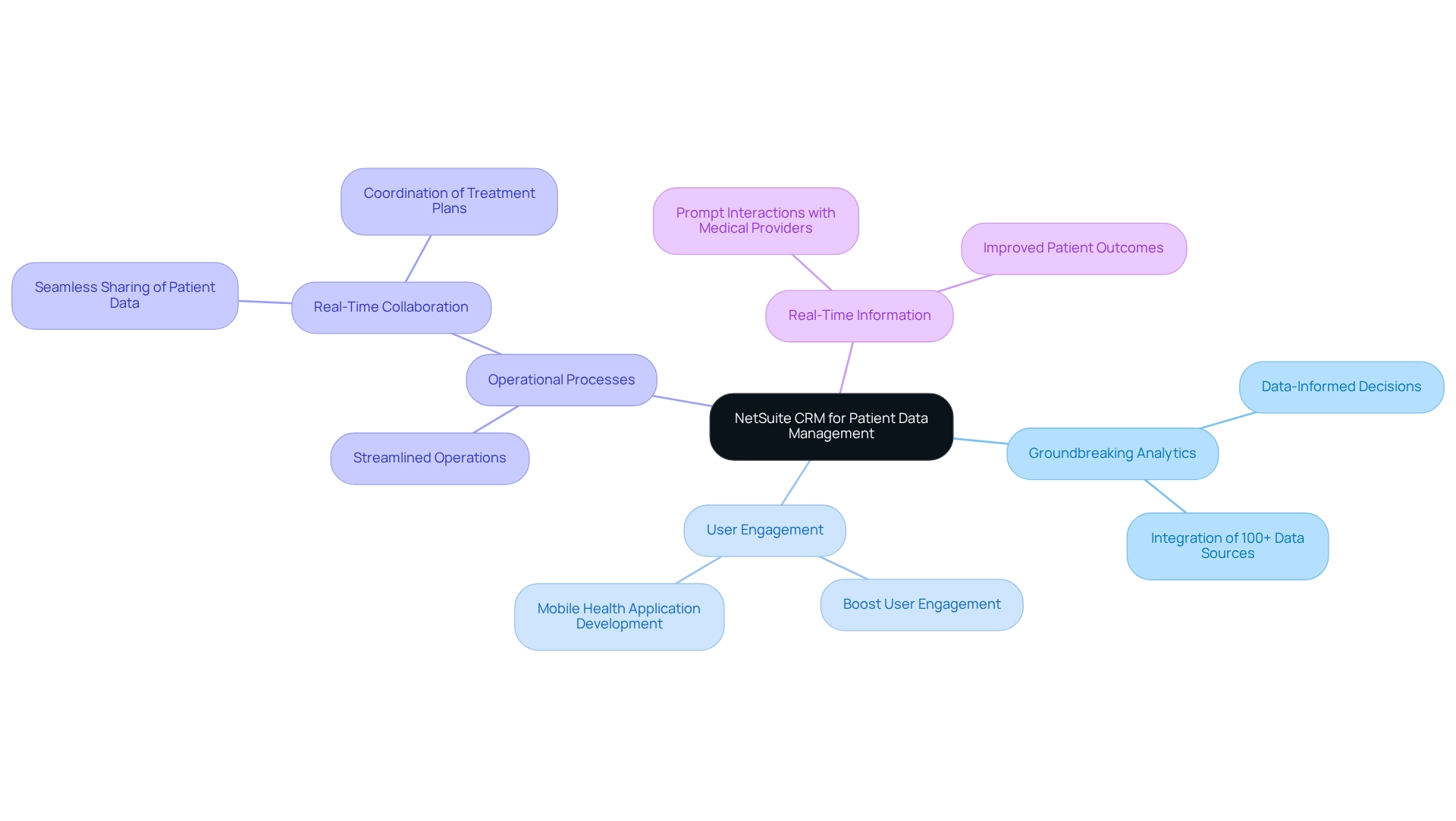
Conclusion
The exploration of innovative CRM solutions in healthcare reveals transformative potential for enhancing patient care and operational efficiency. CareSet’s deep analysis of Medicare claims data offers invaluable insights that empower healthcare organizations to make data-driven decisions, ultimately improving treatment strategies and patient outcomes. As demonstrated through various case studies, platforms like Salesforce Health Cloud and Microsoft Dynamics 365 Healthcare facilitate stronger patient engagement and streamlined operations, which are crucial in an increasingly complex healthcare environment.
Moreover, the adaptability of tools like HubSpot CRM and Zoho CRM underscores the importance of personalized communication and operational efficiency in managing patient relationships. The integration of advanced analytics, as seen with Pega Healthcare CRM, further highlights the role of predictive insights in anticipating patient needs and improving health outcomes. Each of these solutions showcases the necessity for healthcare providers to leverage comprehensive data and technology to foster a patient-centric approach.
As the healthcare landscape continues to evolve, the adoption of these cutting-edge CRM solutions is vital for organizations striving to enhance patient interaction and care delivery. By prioritizing data-driven strategies and effective communication, the healthcare industry can move towards a more efficient and patient-centered future, ultimately leading to improved health outcomes and greater patient satisfaction. The advancements in CRM technology are not just enhancing operational capabilities; they are reshaping the very essence of healthcare delivery for the better.


